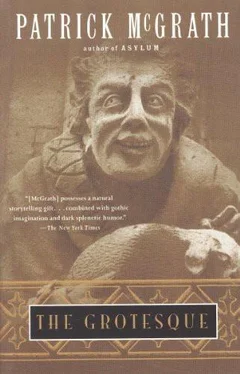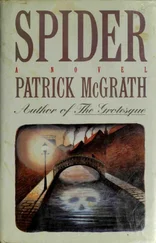So it was, then, that after Fledge had poured and served the coffee I told him to bring Herbert to the table.
“Sir?” he said. Harriet, clearly, had not mentioned Herbert when she outlined the man’s duties to him.
“Oh no, Hugo, please,” she said.
“My dear,” I said, “didn’t you tell Fledge about Herbert? Come, Fledge,” I said, rising to my feet and dabbing at my lips with a starched white napkin, “and meet Herbert.”
Fledge was soon instructed in the proper method of extracting Herbert from his tank, and bringing him to the dining room; and though I could tell the man had no natural feeling for toads, he showed not a flicker of distaste at performing the, to him, disgusting task. Soon Herbert was established on the table, with a big plateful of squirmy white maggots in front of him. I told Sidney that it was once thought that toads were poisonous, but the secretion in question was in fact merely a sort of defensive slime that is highly unpleasant to predators. “Really?’ said Sidney, and set down his coffee untasted. It was at that point that I noticed the butler’s eyes upon me, glinting, for the first time, from beneath hooded lids, with unmistakable hostility; but no sooner had I apprehended the fact than he shifted his glance and continued about his duties.
After lunch I returned to the barn and had, I seem to remember, rather a good afternoon with the leg.
The brain is poorly comprehended by our doctors, though none of course care to admit just how profound is their ignorance. They prefer to gloss over the gulfs in their knowledge with jargon —screeds of verbiage that never explain, only occasionally describe, and generally obfuscate. Take this, for instance: “Damage to the posterior sectors of the inferior frontal convolution of the patient’s left hemisphere may have been the cause of the disintegration of his capacity for speech.” It was my damaged convolution they were referring to here, but could any of them explain to me (even if they thought it worth the effort, which they didn’t) why certain mental faculties were spared, and the rest frozen? Why am I able to see, know, and evaluate the world, yet lift not a finger, nor even blink at will? They don’t know. In fact, they don’t even know that I am capable of experience. Only Cleo does; and possibly Fledge.
Consciousness can be inferred only from behavior, and as I produced no behavior after my “cerebral accident” (about which more in due course), I remained to all intents and purposes a vegetable. No one ever actually called me a vegetable, not within my hearing; but there are other ways of saying it. Toward the end of my hospitalization I remember being wheeled out in front of a group of medical students in order that certain points about catalepsy could be made. It was remarked by a neurologist called Dendrite, who took an occasional interest in me, that I lacked “mental presence,” that I was “ontologically dead.” He went on to describe what he called the “clinical picture.” He referred to my “severe masking,” to my “cataleptic fixity of posture,” to my compulsive grimace, my grinding teeth, my stertorous breathing, accompanied, he said, by “guttural phonation not unlike the grunting of a pig.” Mortified as I was by this last remark, it did not cut me as had the reference to my ontological deadness. What torture, after all, could compare to an experience of isolation like mine? I, ontologically dead? I was, I believe, the most ontologically alive person in that room.
This, then, is the “I” who speaks: cocooned in bone, I pupate behind a blank and lizardlike stare, as my body is slowly consumed by its own metabolism. “He is a pitiful, motionless, misshapen man, unwholesome in appearance and destined to vegetate for the rest of his days.” My neurologist never actually said this, but he might as well have. As for destiny, I have come to believe that to be a grotesque is my destiny. For a man who turns into a vegetable —isn’t that a grotesque?
I seem to remember I was out in the barn the morning the Fledges arrived. I still had the use of my body in those days, I was an active man doing hard intellectual work, not so young that I took for granted my own health and vitality, nor old enough to have become preoccupied with them. I was middle-aged, a middle-aged scientist, in fact a paleontologist, an expert on the great carnosaurs of the late Mesozoic era. I was extremely busy at the time, for I had an important lecture to deliver to the Royal Society; this partly explains why I had no part in the hiring of the Fledges. Harriet saw to all that.
Harriet is my wife. I will not pretend that ours has been a happy marriage, and now that I am paralyzed I find myself saddened at what we wasted. The fault is largely mine. Harriet believes the doctors when they tell her I am a vegetable, she has no reason to think otherwise. We created no strong spiritual bond, nothing that might enable us to transcend my paralysis and maintain contact. With Cleo this is possible, but not with Harriet. She makes sure that I am properly attended to by Mrs. Fledge, but except in one important regard her life has not changed dramatically with my condition; you see, from Harriet’s point of view I have always in a sense been paralyzed. What has changed is that for the first time since our marriage she has become interested in another man. The new man in her life is Fledge.
It was Harriet, as I say, who hired the Fledges. She went up to London and interviewed them, and came back very impressed. She engaged them on the spot, and I was not very happy about that, as there seemed to be some difficulty with their papers. They’d been in the employ of a coffee planter in Kenya, a man who apparently was trampled by an ox and expired without writing them references. But Harriet was sure there wouldn’t be a problem. She had a “feeling” about them, she said. And since the servants’ wages come out of her money, not mine, I merely registered an objection and left it at that.
On reflection this strikes me as fairly typical of my involvement in the running of the house—I occasionally registered an objection and left it at that. You see, I had for so long been preoccupied with my bones that I was oblivious to the domestic arrangements that formed the grounds, so to speak, of my existence. I ate, I drank, and I slept in the house, but my passion, my vitality— that was exercised only in the barn. I lived in the barn, I merely existed in the house. This is not to say that I bear no responsibility for what followed. On the contrary, I was derelict, I see that now, in letting Harriet have a completely free hand to staff the house as she saw fit. Though I must say in my own defense that I had never had reason to doubt her judgment; there was never a problem with the Domes.
I was in the barn, then, when the Fledges arrived. I can imagine only too well what happened: Harriet came to the front door and exclaimed: “Mr. and Mrs. Fledge!”—then opened her arms in a brief ceremonial gesture of welcome. She has a way of doing this, a way of greeting visitors, that implies that with their arrival all, at last, is well. It’s an endearing trait, and but one manifestation of Harriet’s “warmth.” Harriet herself, I should perhaps tell you, is small, plump, and fifty, dresses in trim and comfortable tweeds, and her crowning glory is a magnificent head of coppery tresses which she coils in a bun at the back of her skull and fastens with a sort of knitting needle. Her complexion is pink and unblemished, and she has little, nibbling teeth, like a hamster’s. Cleo does not take after Harriet at all; Cleo is a true Coal, she takes after me.
Do you detect bitterness here? Am I displaying the suppressed rage that simmers constantly in this dying heart of mine? I cannot deny it; if Harriet had kept her wits about her, if her intuitive faculties had not been dulled long ago by a compulsion to observe what she calls “the proprieties,” she would never have brought the diabolical man under my roof, and I would not be in this wheelchair today. But this is wishful thinking. It is not my intention to whine, merely to describe what I have suffered at the hands of a treacherous servant and a faithless wife. You may, when you have heard me out, bestow upon me your sympathy, and then again you may not. It hardly matters; when my story is over I shall be dead.
Читать дальше












